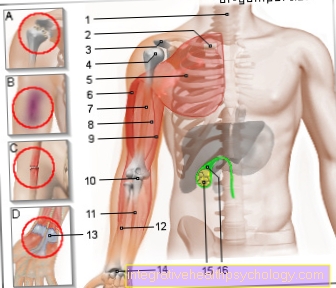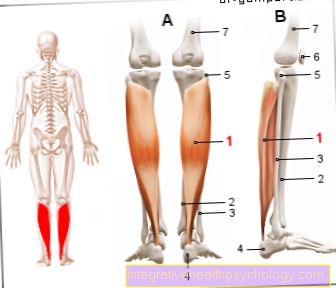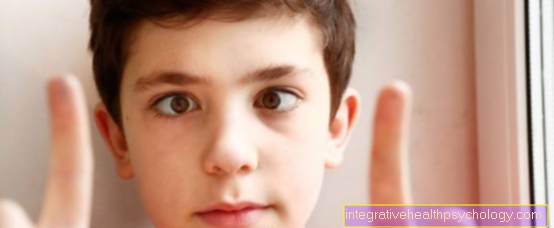What can be causing eye twitching?
introduction
Many people are familiar with the sudden onset of eyelid twitching, which is often perceived as very uncomfortable and annoying. The twitching can only last a few seconds or several minutes.
The causes of the twitching of the eyelid muscles can be very diverse, but usually it is harmless and there is no major illness behind it. Only in rare cases can an increased occurrence be an indication of a disease that must be clarified by a doctor.

Overview of the possible causes of eye twitching
Eye twitching, or the twitching of the eyelid, is caused by increased excitation of the muscles in the eyelid and around the eyes by overexcited nerves. The twitching of the eyes can only occur on one side or on both sides. In most cases, the attack will stop after a few minutes.
As a rule, there is no serious illness behind it. For most people who experience twitching eyes, these are the causes
- Nervousness,
- Stress,
- Lack of sleep or
- Magnesium deficiency.
Eye strain, for example from playing a lot of computer games, can also lead to twitching of the eyes. Furthermore, massive consumption of caffeinated drinks such as coffee, cola or energy drinks can lead to twitching eyes. Burnout syndrome is also a typical cause.
Another cause can be an increased sympathetic nervous system, for example in the heat in summer. In addition, increased sweating in the heat increases the excretion of blood salts, for example magnesium, the deficiency of which can lead to twitching eyes. Various vitamin deficiency diseases can also cause eye twitching.
Only in rare cases is the twitching of the eyes caused by a serious illness, such as multiple sclerosis or a brain tumor.
Is the twitching of the eyes due to stress?
Eye twitching occurs in most people due to stress.
It can appear involuntarily in stressful situations or develop into a trigger. Patients react to very specific situations with a lot of inner tension, for example, and twitching of the eyes occurs more often, for example just before a speech is to be given in front of a large group.
If there is an improvement in the eye twitching due to rest and relaxation, one can generally assume that the cause was only an increased stress level. The times of relaxation should best be spent in the fresh air and not playing computer games or watching TV.
You can also find out more at:
- What are the consequences of stress?
- Reduce stress in everyday life
Eye twitching from contact lenses
Wearing contact lenses leads to constant irritation of the cornea. The long-term irritation can also lead to inflammation of the eye.
If the eye is irritated, for example by dirt or dryness, the body tries to clean and moisten the eye by blinking several times. The contact lenses could overactivate the nerve fibers and increase the blink frequency. In addition, surrounding muscles can be activated and lead to muscle twitching.
If inflammation occurs, patients should initially refrain from wearing contact lenses for a few days until the inflammation has recovered. Usually, there is a reduction in the twitching of the eyes within a short time.
If eye irritation does not subside within a few days, a visit to an ophthalmologist is recommended. The same applies if there is constant twitching of the eyes when wearing contact lenses.
Find out more at: Contact lens intolerance
Eye twitching from migraines
Migraines are a type of severe headache that is particularly attack-like and often one-sided. Often there is also visual field loss (Scotomas), Paresis, nausea and vomiting during the attack.
Some patients feel certain harbingers before the attack. This may include the appearance of twitching eyes. In the case of a migraine in the area of the visual center in the brain, there are more symptoms in the eye, such as scotomas, flashes of light or eye twitching. Eye twitching is not a typical syndrome in migraines, but can certainly occur.
also read: What happens in the event of a migraine attack?
Can the twitching of the eyes indicate a vitamin deficiency?
Another cause of eye twitching is the lack of vitamin B12 (cobalamin). This deficiency is usually caused by malnutrition, i.e. insufficient intake of the vitamin, for example with a strictly vegan diet or long-term alcohol consumption. But also diseases like
- Type A gastritis,
- Celiac disease and
- Crohn's disease can lead to a vitamin B12 deficiency.
In addition, there is often a vitamin deficiency during pregnancy.
The vitamin B12 plays an important role in the formation of the myelin sheaths around the nerve cells. A deficiency leads to neurological disorders of the sensory and motor functions (funicular myelosis). Muscle twitching and abnormal sensations can result.
Eye twitching is not a typical symptom of vitamin B12 deficiency, but it can occur.
A vitamin B12 deficiency can primarily be treated by changing your diet. Vitamin B12-rich foods such as fish, cheese and eggs etc. should be consumed.
Read on under: Deficiency of vitamin B12
Eye twitching due to deficiency
Eye twitching can also be caused by a magnesium deficiency.
Magnesium is an electrolyte in the body, which is responsible for processing impulses in nerve and muscle cells. A deficiency leads to overexcitation of the nerves and thus to muscle twitching, both in the eye and in other parts of the body.
Besides, it leads to
- Muscle cramps,
- Fatigue,
- Dizziness,
- Headache and
- inner restlessness.
Magnesium is usually supplied to the body through diet. If there is insufficient magnesium intake, deficiency symptoms can quickly develop. Pregnancy, increased alcohol consumption and chronic illnesses can also lead to magnesium deficiency.
The magnesium in the blood can be determined for diagnosis. For treatment, patients should primarily change their diet and consume more foods rich in magnesium, such as legumes, cocoa, spinach and nuts. There are also tablets or effervescent powder to increase the magnesium balance.
Iron deficiency is also often associated with eye twitching. However, muscle twitching rarely occurs with a lack of iron.More typical symptoms are fatigue, poor concentration and brittle nails.
Can the twitching of the eyes be psychosomatic?
The definition of a psychosomatic illness is that there is a close connection between disorders of the body and soul.
When there is great psychological stress, different physical symptoms can develop, but these cannot be explained by any disease. These include long-term family and professional conflicts, the loss of loved ones or a high level of stress.
Since stress is one of the most common causes of eye twitching, the symptom is common in psychosomatic illnesses.
However, before the diagnosis of psychosomatic illness is confirmed, all other possibilities must first be ruled out.
You might also be interested in that: Psychosomatics
Is twitching a sign of epilepsy?
In epilepsy, nerve fibers in the brain can be over-excited. In epileptic seizures there is a typical picture with rhythmic twitching, loss of consciousness and convulsions. There are different types of seizures.
During seizures, the muscle twitching can also manifest itself in the form of eye twitching. Often, however, the patient's eyes are closed or half-closed during an attack.
Conversely, the mere occurrence of eye twitching does not directly lead to the suspicion of epilepsy.
Learn more at: How do you recognize epilepsy?
Eye twitching from cervical spine syndrome
An injury or a herniated disc in the cervical spine can cause different symptoms, depending on the location of the lesion. The sensitive nerve fibers that emerge from the spinal cord at the cervical spine are responsible for the skin sensations on the head.
If pressure is now applied to the spinal cord at the level of the first or second cervical vertebra, muscle twitching or sensitivity disorders, similar to a tingling sensation, can occur in the area around the eyes.
In the course of a herniated disc, however, the muscles are often paralyzed. Since the eye muscles are controlled by cranial nerves that exit directly from the brain, twitching of the eyes in cervical spine injuries is rare.
Read on below. Effects and consequences of the cervical spine syndrome
Can twitching eyes indicate a stroke?
Eye twitching is not a typical symptom of a stroke, but it can occur in rare cases. A brain infarction leads to an undersupply of parts of the brain and thus to a prolonged failure of brain functions.
Typical symptoms are
- Dizziness,
- Loss of consciousness,
- Changes in language,
- Memory loss and
- Paralysis.
- Visual disturbances can also occur if there is a stroke in the visual cortex.
Eye twitching is rare, more often it is an additional symptom, the cause of which, however, lies elsewhere.
Find out more at. These are the signs of a stroke
Can the twitching eyes be indicative of MS?
Multiple sclerosis (MS) is a chronic inflammatory disease of the central nervous system in which nerve fibers become demyelinated. This leads to a decrease in nerve conduction velocity and has a particular impact on the cranial nerves. It usually occurs in a relapsing manner and leads to a variety of symptoms, the symptoms being dependent on the part of the CNS in which the lesions occur.
In MS there are different symptoms over time, including also affect the eyes, including above all the formation of double vision and Ophthalmoplegia. Inflammation of the optic nerve and decreased vision are among the early symptoms of MS.
The nerve damage can also cause eye twitching, but it is not one of the typical symptoms of MS. It is much more likely that eye twitching alone is a more harmless cause than multiple sclerosis. If there are several different neurological symptoms, MS should be ruled out by a neurologist.
Can a brain tumor cause eye twitching?
Both benign and malignant neoplasms in the brain can cause very different symptoms, depending on the location and extent of the tumor. The most common initial symptoms are headaches and epileptic seizures, as well as disorders of consciousness and neurological deficits.
However, eye twitching is rarely caused by brain tumors. In some cases, the tumor presses on the nerves that are responsible for the muscles in the eye. This can lead to overexcitation and ultimately leads to eye twitching. In addition, an epileptic seizure can be accompanied by eye twitching.
However, the mere occurrence of eye twitching does not directly allow the suspicion of a brain tumor. If it occurs over a long period of time or together with other symptoms, a neurological evaluation by the doctor and an imaging examination, such as e.g. an MRI done.
Read on below: Signs of a brain tumor
These are the accompanying symptoms
The twitching of the eyes is mostly only noticed by the person affected, whereas the movements of the eyelid are not or only very difficult to see for other people.
Typically, there are quick, small movements in which the lid is not closed completely, but only "flutters".
The twitching repeats itself a few times, then disappears and reappears after a while.
This process can be repeated for several hours or over a longer period of time.
Occasional twitching of the eyes is not a disease and does not necessarily have to be accompanied by further symptoms.
However, depending on the cause, other complaints can occur:
- Fatigue,
- A headache,
- Dizziness,
- Anxiety or
- nervousness
Palpitations and increased blood pressure can also be caused by stress and twitching of the eyes.
In the case of neurological diseases, in addition to fluttering eyes, various disease-specific symptoms may occur.
If you additionally Muscle twitching all over your body all over your body, find out more here!
a headache
In many cases, the twitching of an eyelid is accompanied by a headache.
Most of the time, both complaints are harmless and can be traced back to an increased level of stress.
Eye strain, exhaustion or tiredness can also be reasons for eye twitching and headaches.
A migraine attack or deficiency symptoms (e.g. a lack of iron, vitamin B12 or magnesium) can also cause such symptoms.
In rare cases, serious illness is behind these symptoms.
A brain tumor, for example, often causes unilateral headaches that are accompanied by a twitching eye.
Inflammation in the brain caused by an infection can also cause headaches and eye twitching.
In the case of severe pain that lasts more than two days and occurs with a twitching eye, a medical evaluation of the symptoms should be carried out.
The best way to do this is to contact a neurologist.
You can read about the symptoms of iron deficiency in the following article: You can recognize iron deficiency by these symptoms
We also have a suitable article for you on how to recognize and treat mineral deficiencies: Mineral Deficiency - Identify and Treat
Recommendations from the editorial team
You might also be interested in these topics:
- Eyelid twitching
- reduce stress
- Muscle twitching





















.jpg)







